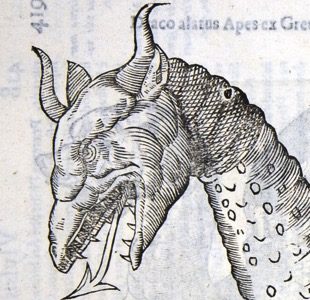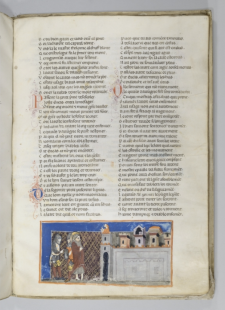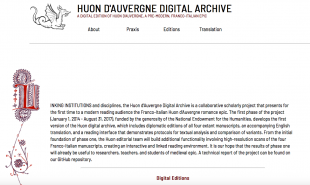[Enjoy this first installment of the DH Project Spotlight Series, a series of posts on the DH @ W&L blog that investigate Digital Humanities projects from a student perspective.]

My exploration of the many interesting DH projects starts with the Huon d’Auvergne Digital Archive. Led by Steve McCormick, Associate Professor of French and Italian at Washington and Lee University, the project makes Huon d’Auvergne, a Franco-Italian epic that is obscure even within the field of medieval studies, accessible after hundreds of years. The epic, which exists today thanks to four remaining manuscripts, details the story of its hero as he fights a fire-breathing dragon and is sent to Hell by the King in one of the first scenes to cite and imitate Dante’s “Inferno.” The four manuscripts that remain indicate that Huon d’Auvergne was so popular that it was translated into different dialects, allowing a new tradition of the embellished story to form.
The Huon d’Auvergne Digital Archive project has three phases, incorporating all four versions of the epic. Phase One, which is complete, included editing the text and making the manuscripts available on the website. Phase Two, which is currently in progress, involves bringing high-resolution images to the digital archive. The Huon d’Auvergne team partners with the libraries in Italy that house these manuscripts, which give the team the rights to put these images on the website. DH Fellow Megan Doherty ’19, who works on this project, said that this process requires a lot of trial and error with the coding work. Doherty remarked figuring out how to code on her own with the help of McCormick and the DH Program. Phase Three will involve editing more manuscripts, bringing in some of the texts that elaborate on Huon d’Auvergne.

Currently, Doherty helps McCormick bring high-resolution scans of the four existing manuscripts to the project, working with the International Image Interoperability Framework (IIIF), and creating a server on which to put these images, using Mirador, an image browser. As a result, Huon d’Auvergne will be available for anyone to read with the additional benefit of seeing the text illuminated through illustrations.
According to McCormick, within medieval studies, a book isn’t just a book and an epic isn’t just an epic. Therefore, it remains important to think about how the story is transmitted to a larger audience and on what material or platform the story is read because this changes how the story is understood. The versions of Huon d’Auvergne, which were intended to be read on animal skin, are not all exactly alike, so providing the images from each of the existing manuscripts on the Huon d’Auvergne website gives this project additional context that each print version alone does not. Doherty cites this accessibility as a reason why DH is so useful and significant to interpreting and presenting the epic to a larger group of people, aside from making for a fun project on which to work and with which to engage.
So many of the things we talk about in classrooms are much more conceptual, but to be able to actually see the manuscripts and work with them while doing the reading is helpful and enlightening.” -Megan Doherty ’19
McCormick finds the project exciting because he collaborates with two other co-principal investigators, Dr. Leslie Zarker Morgan from Loyola University and Dr. Shira Schwam-Baird from the University of North Florida and because the project was awarded funding from the National Endowment for the Humanities, which is difficult to get and a prestigious indicator of the project’s merit. Former DH Fellow Abdur Khan ’17 worked on the Huon d’Auvergne Digital Archive while he was a student at W&L. Now, Khan attends Loyola University Chicago and studies Digital Humanities, providing an example of how DH brings people from different levels together and inspires further engagement with the discipline, embodying the spirit of DH. DH work not only takes something as obscure as Italian epic and makes it accessible to a larger group of people, but it also exhibits the collaborative work of scholars, students and faculty, differentiating it from traditional scholarship.
“I get to work with great students like Megan, and I get to bring them what I find exciting about medieval epics and help them get something out of the work as well.” -Steve McCormick
Encouraged by her work with Huon d’Auvergne and the DH Program, Doherty is pursuing a French Honors Thesis working with medieval manuscripts, hoping to incorporate a DH component. Specifically, she looks at LGBTQ+ representation during the Middle Ages by examining patterns in the text, reading theory that has been published on how to study same-sex relationships before the language for it was inherited in the 19th century, and considering how people spoke about same-sex relationships without this accepted language to describe it. Doherty is also interested in the illumination aspect of the manuscripts, including the medieval art presented on their pages.

Doherty was awarded the Mellon grant to work as a Summer Student Researcher with McCormick on the project and the website, putting coordinates on the pictures and mapping them out to create an interactive experience with the text, including pop-ups filled with small bits of information. Additionally, Doherty has the unique opportunity to help McCormick publish an article about the project, which is an exciting accomplishment for an undergraduate student. The publication will document their process, detailing how they deploy technology skills in the context of the manuscripts and why the Huon d’Auvergne Digital Archive is an important project.
“A big takeaway from DH is for us to realize that we’re in a moment of enormous change in history in which we must move from print to digital, and it’s urgent. Every artifact we have needs to be encoded in programs and represented digitally.” -Megan Doherty ’19
By extension, Doherty recommends that students take DH classes here at W&L because the skills and topics covered in these classes could help students realize that there are so many different aspects to the projects and literature with which they traditionally work. In essence, DH is applicable to nearly everything, and it expands learning in the classroom beyond what we normally consider.
This post was written using interviews with Professor McCormick and Megan Doherty ’19.
-Jenny Bagger, DH Undergraduate Fellow
1 reply on “DH Project Spotlight Series: Huon d’Auvergne”
A terrific article! It shows how learning (erudition, even), technology, and teamwork go together to advance our knowledge. Kudos to McCormick and his students past and present. We all need to know more about how epic, its psychological infrastructure, and its dissemination (oral and manuscript and printed) link us as humans. The Franco-Italian tale of Huon d’Auvergne shows the forward momentum of several dialects carrying the “same” story to many audiences of varied linguistic and national traditions. Atta go literature!